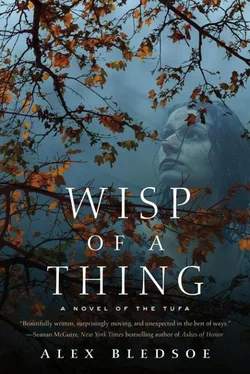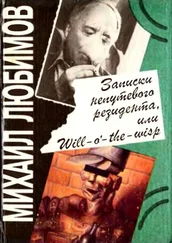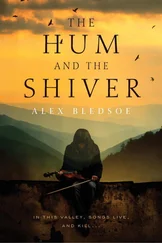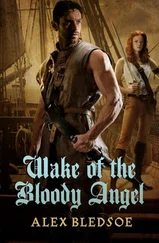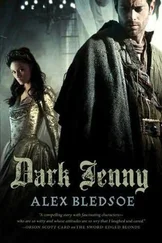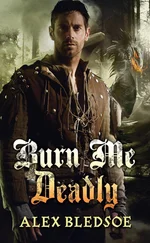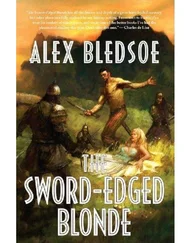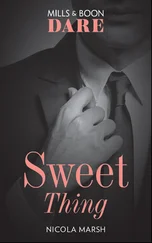Darkness thicker than any city night had fallen, and he heard nothing but wind, crickets, and the occasional owl. A brief, spooky shudder rippled through him as he realized how cut off he was from real civilization.
As if to emphasize this, a coyote chose that exact moment to howl its shrill, vaguely mocking cry. That made him smile, and his paranoia retreated. It was, after all, the twenty-first century, and even here, he had wireless access. How isolated could he really be?
He adjusted the window to block most of the chilly night breeze. His solitude enveloped him anew, a pressure that seemed to leave him weightless and insubstantial. Would anyone care if he vanished from this room? Would he inspire more than a knowing “tsk” from anyone who knew him? At best, he’d become the answer to a trivia question, a footnote in pop-culture history.
He was so engrossed in these self-pitying thoughts that he jumped at the knock on his door. “Come in,” he said when he got his breath.
Doyle opened the door. He’d changed from his gas station clothes and now wore jeans and a University of Tennessee T-shirt. “Hi, you about ready?”
“Yeah. Fell asleep. Sorry.”
“There’s some local boys got a pickup bluegrass band playin’ down at the Pair-A-Dice tonight. My wife and I generally go for a while, so I thought I’d see if you might want to tag along.”
“Definitely, thanks.” He splashed some water on his face, combed his hair, and touched up his deodorant. Then he carefully wiped his guitar’s strings and put the instrument back in its case. He wished he could spend just five minutes alone with his music; playing always grounded him.
Rob followed Doyle downstairs. In the lobby, a young woman rose from one of the overstuffed high-backed chairs as they entered. Tall, willowy, with jet-black hair and dark skin, she reminded Rob of the cliché image of an Indian princess from one of the souvenir plates his mother collected.
“Hi,” she said, and snuggled into Doyle’s embrace when he put his arm around her shoulders. To Rob she said, “You must be the fella with the bad starter.”
My starter’s working just fine, Rob wanted to say as he surreptitiously admired her, but instead replied, “Yeah. Quite a handy husband you got there.”
“He’ll do.” She was almost as tall as Doyle, and jabbed him playfully. “So are you going to introduce us, or should I just call him ‘Yankee guitar boy,’ like you do?”
Doyle had noticed Rob’s reaction to Berklee; every man had the same one when they first met her. As always, he let it slide. “Rob Quillen, this is my wife, Berklee.”
Rob shook her hand; it was small and strong, with elegant nails. He wondered what she did for a living. “Berklee like the music school?”
“No, Berklee as in my daddy, Berk, really wanted a son and had to make do with me. But it’s spelled like the school.” Her eyes narrowed. “Excuse my rudeness, but… do I know you?”
“I don’t see how.” He smelled beer on her breath.
“It’s probably just that black hair. You look like you could be a Tufa.”
“’Fraid not,” he said.
“So are you going to sit in with the boys at the Pair-A-Dice tonight?” she asked.
“Nah, I’m just going to listen.” Rob had learned the hard way that showing up with his guitar did not automatically gain him entrance to a local music scene. If anything, his TV fame often just pissed them off. They felt, quite correctly, that it was only dumb luck that he’d been chosen over them, and probably resented the tragedy that had overtaken him and made the spotlight even brighter.
“Well, if we want a decent leanin’ spot on the wall, we better get on down there,” Doyle said.
Rob nodded, followed them out the door, and after an inadvertent glance at her gracefully swaying rear, made an inner vow to stop thinking of Berklee as a human woman right then and there.
* * *
Peggy rested her chin in her hands and watched the night through the window. She felt guilty for almost breaking Rob’s confidence, but also a heartrending sympathy for him. It was the biggest Tufa weakness: the ability to empathize all out of proportion to the relationship. She barely knew the boy, but his plight caused her almost physical pain.
Had he been even part Tufa, she would’ve known what to do. But he had no blood in him, despite his appearance. So she was at a loss.
Then she had an idea. She reached for the phone and dialed a number she knew by heart.
“Chloe? It’s Peggy. Is Bronwyn there?”
The Pair-A-Dice was a rectangular cinder block building, windowless and with only one visible door, set back from the highway in the center of a dirt parking lot. Only the two enormous cutouts of dice on the roof, visible as Doyle’s truck topped the hill, implied that it was anything other than someone’s old work shed.
Rob spent the whole ten-minute ride jammed against the passenger door, as it seemed prudent not to press himself too closely against his new friend’s wife. Now, as his tennis shoes hit the gravel, he heard banjo, fiddle, and guitar mingle in a swirling bluegrass spiral metered by enthusiastic clapping. This moment just before entering a new music venue always gave him goose bumps, and the fact that he couldn’t immediately name the song sent extra adrenaline rushing through him. Maybe this band played songs he’d never heard before. Maybe—he couldn’t help but hope— Tufa songs. Maybe even the song. Could “carved in stone,” as the man told him, have meant inside a concrete building?
Cars and trucks formed an irregular circle around the place. The air smelled clean and fresh, helped by the wind’s faint autumn bite. When he looked up, Rob saw a pinpoint ocean of stars, with the crescent moon waiting like a cup to catch any that fell its way.
The moon had risen behind a distant, incredibly tall tree. “What kind of tree is that?” Rob asked, pointing.
“That’s the Widow’s Tree,” Berklee said.
“What does that mean?”
“Widows carve their husband’s name on it. It helps them get over the loss.”
“Really?”
“They say. Don’t have any experience with it myself.”
“And I’m glad to hear that,” Doyle said. He indicated the full parking lot. “Looks like a good crowd.”
“Rockhouse brings ’em out of the woodwork,” Berklee added, forcing her gaze to the ground. “Both sides come out to hear him.”
“Both sides of what?” Rob asked. When no one answered, he added, “So, I take it they play bluegrass?”
“Bluegrass is what they call it in Nashville,” Berklee said disdainfully. “Everything needs a label there.”
“If we’re real lucky, Bliss Overbay’ll sit in with ’em,” Doyle said. Immediately, he regretted it.
Berklee jabbed him with her elbow in a gesture that appeared playful, but was a bit too emphatic to be a joke. “If she does, you better be as far away from her as that room allows, my friend. I shit you not.”
“You’d have to eat me first,” Doyle said. He grabbed Berklee’s hand and held it tight. Like her drinking, her jealousy had grown much worse lately, and Doyle prayed she wouldn’t make another scene if Bliss did show up. The last time, he’d had to carry her out like a child having a tantrum.
The music surged out when Doyle opened the door. Not only was the band loud, but everyone in the packed room seemed to be clapping along and stomping in unison as well. To Rob, it was both a cliché and a wonder. “Wow,” he said. It was the only appropriate word he could think of.
A young, giddy couple on their way outside pushed awkwardly past them. “’Scuse us!” the boy called back over his shoulder. The girl kissed him and, without letting go, practically yanked him around the corner of the building. Both had jet-black hair and Tufa features.
Читать дальше
